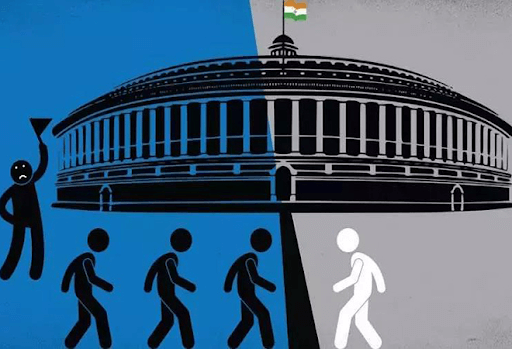This article is written by Goutam Mishra, from Ram Manohar Lohiya National Law University, Lucknow.
Guest speaker:
Abad Ponda, Senior Counsel, Mr. Abad Ponda is a renowned advocate and has been appointed as the Amicus Curiae by the Bombay High Court in Shakti mills rape case. He has appeared as a lawyer in many such famous cases.
Hosts:
Ruchika Motwani, Associate at Lawsikho, is an experienced Legal Associate who has worked with many renowned companies and firms in the past.
Adarsh Vasudeva, is a first-year student at Government Law College, Mumbai.
Aswathy Vinod, is a fourth-year student at Government Law College, Kochi.
What is defection and who decides the legality of a defection case?
A case of defection arises when a candidate of one party (or, independent) elected by the citizens to be their representative decides to shift to another party after elections. People vote according to the goals/promise/ideals of the candidates to be their representative and trust them with the power of governing them. Hence, defection is a breach of faith that the people entrusted in these candidates.
What is the history of Anti-defection laws?
The concept of defection started when Gaya Lal (a then candidate of Indian National Congress), member of Vidhan Sabha of Haryana chose to change parties twice in a day and thrice in a fortnight. There were several attempts after this by candidates of different parties to change their political parties after elections. Prior to the enactment of the existing anti defection laws, there were two failed attempts of opining the regulation. The first was in 1973 by 32nd amendment to the constitution and the second was through the 48th amendment, both of which failed due to the elapse of time. Finally, in 1985 the Rajiv Gandhi government (through, 52nd amendment) framed the anti-defection law as part of the 10th schedule of the Constitution of India. Article 190 deals with anti-defection.
What does the Anti-defection law say?
Under the Anti-defection laws, if a person belonging to a particular political party voluntarily gives up his membership, or votes/does not vote as per his party’s desire, he/she is liable to be disqualified. In subsequent judgements, The Honourable Supreme Court of India has included voluntarily giving up by conduct in addition to voluntarily giving up by actions in the purview of giving up membership voluntarily. There are two exceptions to this rule:
- A candidate gives up membership voluntarily with prior permission of the party.
- The party condones the act of the candidate within 15 days.
In case of independent candidates (who are not part of any political party), if an independent candidate joins a political party after election then he/she is liable to be disqualified. If a nominated member (by one political party) joins another political party in 6 months, he/she is also liable to be disqualified.
The exceptions to this rule are mergers. In case of mergers, if two parties merge then it is out of anti-defection law. In a case, where people in a party decide to form a separate group and people in the party do not want to join the group, they are not charged under anti-defection law.
What is the role of the Speaker/the Chairman under Anti-defection law?
The Speaker/the Chairman (and their equivalents in State Legislatures) has the power to decide the legality of the act of defection. Para 6 of the 10th Schedule seeks to exempt The Speaker/the Chairman and all questions referred to him shall be treated as proceedings under Article 122/Article 212 (which prohibits courts from interfering in proceedings of the Parliament) of the Constitution which says their actions as far as procedural regularities are concerned are beyond the realm of the courts and they shall not interfere in such circumstances. Similarly, Para 7 of the 10th schedule entails that notwithstanding anything in the constitution no court shall not disqualify a Speaker in matters thereto, where the Speaker decides to disqualify a member.
The question of justiciability of the Speaker’s actions under the 10th Schedule came up for the first time in the famous Kihoto Hollohans case of 1992. In this case, the debate was over Article 122/212, Para 6 and 7, and the role of the courts. The judgement contained a dissenting opinion, in which the court noted that the Article 122/212 and Para 6 and 7 cannot prevent the superior courts from interfering if there’s a case where an illegal act is done by the Speaker. The court also said that the procedures under the act by the speaker are only dealing in nature. A dealing provision cannot transcend its own power which is limited. These proceedings by the Speaker are independently from the house and aren’t proceedings by the parliament or the house. Hence, they cannot be granted unlimited protection. The Speaker shall be treated as a tribunal while these proceedings and hence he is subjected to Articles 32, 132, 136, 226 and 227, if his/her actions entail perversity, violation of national justice, maladies and non-compliance of basic provisions of constitution take place.
What is Quia Timet Action? How is it related to Anti-defection laws?
Quia Timet means he who fears or apprehends. Quia Timet Action entails when there can be interference in case of non-compliance of provisions by the Speaker. The SC in Para 110 and 111 claimed that judicial review by the court is not available prior to the decision of the Speaker/Chairman and Quia Timet Action is not applicable. The only exception to this is when during the pendency of decision by the Speaker by an interim order, he disqualifies the concerned candidate, so that there is grave, irreversible, imminent and immediate danger (otherwise, the Speakers would have the chance to abuse their power by refraining from passing judgements for years).
In the 11th assembly elections in Manipur there was a split verdict, the Congress and BJP both bagged 28 and 21 seats respectively. An MLA referred to as Respondent 3 in the judgement contested from Congress and joined in as an MLA from BJP after elections. Numerous petitions were filed in HC but the HC dismissed the cases stating that the case is pending before SC that whether the court can direct the Speaker to decide the question within a short duration/limit his power. In 2018 January, the petitioner filed his petition again but the court found that this case would amount to defection and the person should be thrown out under the law. But the court also expressed its helplessness in the case. It said that it cannot issue a writ of Quo Warranto. The matter came up to the SC in 2020, where the ASG argued that the SC cannot direct the Speaker to do anything even if he has kept quiet for these many years. The SC went into Rajendra Singh Ranas case and quoted Para 40 and 41, where it had held that the non-application of mind by the Speaker to the case of disqualification amounted to exercise of jurisdiction illegally warranting interference. Also, with respect to Quia Timet action, Para 110 of Kihoto Hollhan’s case compares the position of the Speaker while deciding a disqualification case to that of a tribunal, hence the court can pass an order directing him to dispose off the petition within a reasonable period of time (which was fixed to be three months). But in that particular case, as the Speaker had already spent a lot of time, they gave him one-month time. One month elapsed and the Speaker made a miscellaneous application before the SC of India and asked for eight weeks’ time. Then the motion was withdrawn with the opinion of ASG and asked for 10 days’ time. When the matter came up on 18th March, the SC bench invoked powers under Article 142 of Constitution of India restricted the Speaker from entering the Legislative Assembly and opined that the Speaker shall cease to be a minister forthwith.
Are Speaker’s actions justiciable?
The minority judgement in Kihoto Hollhan’s case questioned the wisdom of Parliament to appoint the speaker as a deciding authority in the disqualification cases. They said, as the Speaker is the part of/affiliated to a particular political party (The Ruling Party), his opinion cannot be independent. Ultimately in the Manipur case, Justice Nariman commented that as the Speaker is de jure/de facto part of a political party the Parliament must consider amending the Constitution to substitute the Speaker as an arbitrator in the disqualification cases by some independent mechanism for the proper functioning of democracy.
An interesting case arose in March, 2020, where the MP assembly elections resulted in a hung Parliament. The INC (121) secured a majority against BJP (107). On 10th March 2020, some members of BJP went to the Speaker and handed over the resignation of 22 members of Congress. The CM wrote to the Governor about the issues and proposed a floor test. Based on this the Governor called for a floor test. The case went to the Supreme Court whether the Governor has the power to call a floor test? In a prior case of Naban Rabia the SC had decided interpreted that the Governor has to function in the aid of the Council of ministers and has no right to have an independent opinion. Hence, tin the present case, the Governor had no right to call for a floor test. But the SC finally ruled that the Governor has the right to call for a floor test and especially when the Legislature is not in session.
LawSikho has created a telegram group for exchanging legal knowledge, referrals and various opportunities. You can click on this link and join:
 Serato DJ Crack 2025Serato DJ PRO Crack
Serato DJ Crack 2025Serato DJ PRO Crack











 Allow notifications
Allow notifications


